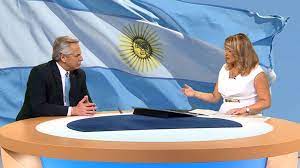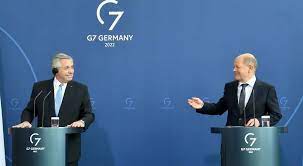When he is in Argentina, he does not dare to confront a kind of atavistic fear of the figure of the «vote-giving mother», whom he detests, but without whose support, he thinks he would not survive.

Emotions affect the way we see and think about the world and our ability to reason logically about our problems. They are often a communication barrier that prevents us from connecting with the world and even with ourselves.
The psychological block is an emotional hindrance that does not allow us to deal with some people, to overcome some obstacles or to get out of some situations that objectively we could solve easily. One of the main difficulties in a blockage is that we cannot get out of the prejudices we have about ourselves and about the situation, to think of a solution because we personalize the problem and we cannot see it beyond our own emotionality. Blocking leads us to not being able to act or think and power is something that is strongly related to both. Nicolas Sarkozy unashamedly stated in 2007 in Le Figaro that he had made Gramsci’s Marxist analysis that «power is won with ideas» his own. Even if they are not yours.
Alberto Fernandez’s surprise trip to Spain seems more a way to escape from the blockage he feels in the face of Cristina’s statements than a planned and fruitful stay in a foreign country.
Basketball as a tool to get kids off the streets
What moves him to travel is the search for freedom from the feeling of suffocation caused by the proximity of the publication of the inflation index, the piquetera march and the incessant declarations of Cristina Kirchner and her supporters.
He was in such a hurry to escape from this oppressive environment that he organized the last meetings on the plane. In Spain they did not expect it because there are also problems of all kinds there, although there are especially the judicial ones that have the power in suspense and that even involve the intelligence services spying on the president.
One concept that helps people to overcome the blockage is to look at the action in life as a gear. Also known as «the principle of cogwheels» this maxim holds that in order to get out of a blockage one must keep in mind that the different parts of life are linked together and that their movement is best produced with small changes in all parts to avoid facing the movement generated in one with the inaction of another rather than concentrating on making a big change in what bothers us the most.
The House of Larreta and the curse of the unwanted
But Alberto’s internal, although he does not say it, is the only wheel of his blockade to which he gives importance, to such an extent that he had to go to Spain to be able to declare in a Spanish TV program his serious intentions to run for reelection and his position in the internal. This naive situation of speaking out in a world that is managed by networks, is the same as children who cover their faces to hide. Anyone realizes that it is the same as what he would have said in La Matanza, but it seems that when he is in Argentina, he does not dare to confront because of a kind of atavistic fear of the figure of the «vote-giving mother» that he hates but without whose support he thinks he would not survive. Alberto then intends to solve the blocked mechanism of his presidency by concentrating only on avoiding Cristina Kirchner and without paying attention to details, unlocking one piece at a time. He does not take into account that if they do not all move a little bit all the time, there will be no movement that will push him to get rid of at least part of some of the many problems he has accumulated during these two years.
In the face of any political decision regarding the internal elections, he escapes and makes excuses. But this leads to the fact that every day it becomes more evident that he has no control over the national structure. His leadership is so worn out that he even sends Matías Kulfas or Martín Guzmán to defend himself against Cristina alone with the excuse that the criticism is for his ministers but not for him. Guzman came out after Cristina’s intervention, as always, to explain and not to offer justifications. As if he thought that we are the ones who do not understand and not him who cannot find the way. And Kulfas denied almost everything, including the fact that his book on the three Kirchnerisms is a criticism of the last government of CFK. Alberto, hidden behind the short sheet of distance, said that the differences should be resolved in a PASO and little else.
In the same way that he blamed his mistakes on the pandemic and now, in part, on the war in Ukraine; the president wants to leave the blame on the side of the internal affairs, on his ministers and who knows who will be the next scapegoat. But the source of his failure is his inability to govern, to form a team and lead an alliance. So the path he is taking is far from solving the main source of problems surrounding the government, which is nothing more and nothing less than his own incapacity in all those areas that he cannot solve because he hides them behind the fear of Cristina’s words.
Alberto, Macri, Cristina and Milei, in a parallel world with patches of reality.
This paralysis caused by pretending that by solving one problem, all problems are solved, also stops the opposition. Although, as it is not in the management, its internal conflicts and obstacles are not noticeable, but it has the same conflicts. In Juntos por el Cambio, the center of the conflict is the internal conflict and in particular they are seen arguing over hasty and senseless things like last week’s episode around Javier Milei.
Although now they proposed to reach a truce after the last meeting, the decision seems to be far from resolving all aspects of the conflict. Macri analyzes the numbers and sees that his bad image does not allow him to be a candidate, and although he would like to be a candidate, he is clear that if he does not want to win, he will not run. That is why Mauricio Macri is now thinking of reprofiling his figure to be an assembler or mediator between the parts of the PRO and not to lose his centrality as a referent. The two groups of the PRO are aiming at the presidency and are working with their own groups, although they agreed to continue working to take their foot off the accelerator in the fight for the internal elections because there is still a long way to go before the presidential elections and the panorama is still not so clear.
On the other hand, radicalism, after the convention at the end of the month, will see its leaderships more exposed. On one side will be the traditional radicalism and on the other the evolution group. This is shaping up to generate an internal dispute between Gerardo Morales and Facundo Manes for the presidential elections, but this will be only for next year, because it is still left for the radicalism to negotiate in the convention, on the last Friday of May, to see how they start to organize themselves in the way of this internal dispute. For the moment a unified position seems difficult because Manes never tires of saying that he does not want neither the governorship nor the city because he believes that the arrangement for the country must come from above, which distances them from the possibility of neutralizing him with the offer of a position.
Let the fireman come, even if he is in flip-flops.
A key to unblocking is the aforementioned concept of the cogwheel, which implies that by solving small problems in a staggered manner, at the end of the day we will gradually move each of the connected gears and sooner rather than later we will be able to put in full motion the whole issue that is blocking us. The problem, for Argentine politicians, is that the internal issues are growing little by little until they seem unmanageable and they always want to solve them once and for all. For Alberto Fernandez in particular, it happens that in addition to this internal issue that consumes him so much, the country is every day submerged in bigger and more complex problems to be solved in order to move the mechanism that allows him to put into operation the «albertismo» that seems that it is going to stay in the catbird seat without us being able to get to know it.
But let us keep in mind that a people in distress is a people in search of a father and not of a «philanthropic ogre» as Octavio Paz described it in his famous essay. It is looking for someone who can give rise to a modern public space where citizens take the floor and act consciously, and not one where abandoned sectors of the population are born or die where their emotions of fear have turned into emotions of anger and rage against the political system.






